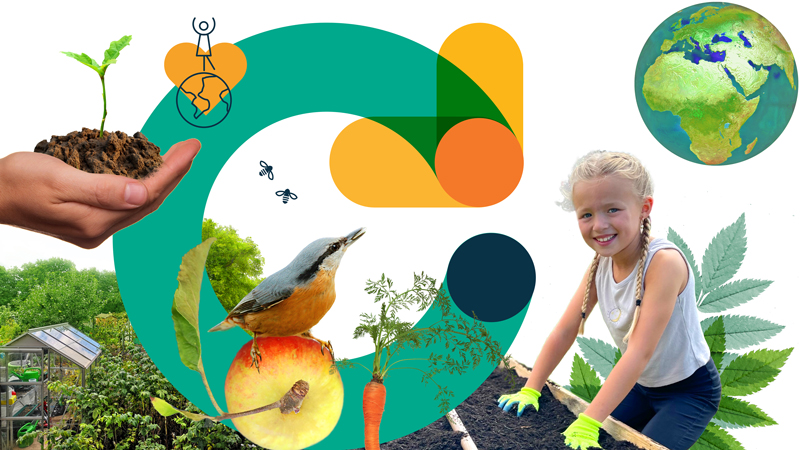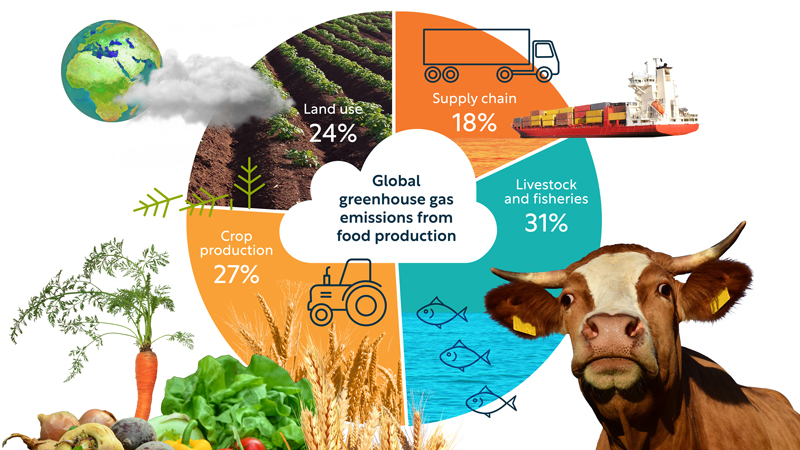
Why it is important
Our climate is changing. Warmer temperatures, changing rain patterns, and more extreme weather events are already affecting food security across the world—and will increasingly do so until global climate action means that the amount of planet-warming gases in our atmosphere begins to decrease.
Leeds has declared a climate emergency and, as part of our climate action plan, the council’s ambition is to achieve net zero carbon emissions as quickly as possible and to boost our city’s resilience to the changing climate.
Yet as well as being vulnerable to the impacts of climate change our food system is also partly responsible, currently accounting for around one-fifth of all the emissions in our national carbon footprint.
We can enable the transition to a more sustainable food system by wasting less food, eating healthier, and producing food in better and more environmentally friendly ways. Leeds is one of the biggest cities in one of the world’s richest countries. We can’t change the food system alone, but we can have real impact if we lead by example. Every action counts.
Energy used to transport and process our food contributes to the food sector’s carbon footprint, so we will reduce these emissions by transitioning to zero emission transport and power as part of other strategies. However, most greenhouse gas emissions from food are released before produce even leaves the farm gates because of factors like fertiliser use, the methane emissions from livestock, and converting environmentally important land like peat bogs and rainforest into farms. We must consider what foods are grown and how they are grown—not just how far foods have travelled.

Food production is essential, and the agricultural community in the UK has made great strides in reducing its impact on the environment. However, farming uses a lot of land and, dependent on how it is done, can be detrimental to nature. This includes the very bees and other pollinators that play a vital role to make foods more affordable and abundant.
The growing of food across the globe will be increasingly impacted by our changing climate, damaging harvests that disrupt supplies and raise food prices. We need to create a more resilient food system by considering the changing climate when we plan which foods to grow where, and by sourcing produce from many different places and suppliers. By doing this we can reduce the impact of supply disruption when it occurs—especially for those experiencing food insecurity.
Ultimately, ensuring the way we produce, consume, and dispose of food is fit for the future and supports our climate action plan is not only necessary and beneficial long-term, but will also help us to improve the quality of life for everyone across the district right now.
Our plan

Objective 1 - Tackle waste by reducing, redistributing, and utilising surplus food
It doesn’t matter what kind it is, throwing any food away contributes to climate change and wastes land, water, money and energy. 25 million tonnes of carbon emissions every year are emitted from the food wasted by households and businesses in the UK. Meanwhile, many families in Leeds experience food insecurity and depend on food aid.
Did you know that the average household in Leeds threw away around 190kg of food in 2021? This has reduced to 30% down 6% (to 145.7kg per year or to 2.8kg per household per week) 2023/2024. By buying only what we need and using our leftovers, we could reduce the largest source of post-farm gate food waste. Together we can all do a little more and make a big difference.
Did you know that the average household in Leeds threw away around 190kg of food in 2021? By buying only what we need and using our leftovers, we could reduce the largest source of post-farm gate food waste. Together we can all do a little more and make a big difference.

Retailers, manufacturers, and food growers all have a big part to play in tackling food waste across the system too. For example, supermarkets and their suppliers can help consumers to reduce food waste through better product information, packaging, and portioning.
Actions to support this objective
- Promoting ways to reduce food waste, working with partner organisations and businesses.
- Redistributing surplus food to those in need, working with partners, organisations and businesses.
- Expanding domestic food waste collections (expected to be from late April 2026, in line with national policy and dependant on government funding).
- Expanding community composting initiatives to more households and areas of the city.

Objective 2 - Raise awareness of how we can eat nutritious foods that are good for the planet
Examples: communications campaigns (Foodwise, LCC), reach, follow up.
Every meal we eat is an opportunity to make a difference. Some types of food will always be more resource intensive to produce than others. Yet most of us are unaware of the impact our food consumption has on the environment. Many foods that are better for the environment can be better for our budget too—such as using local and seasonal ingredients.
Organisations and food businesses can also help by offering healthier, more sustainable foods. For example, they could introduce some form of ‘carbon labelling’ highlight the contribution of different food items on global warming—similar to how many manufacturers and venues display the calories in their foods.
The types of food we eat is our own choice. Some of us may prefer to eat mostly or all plant-based foods. Others may prefer to also include meat, fish, or dairy too. But as a population, our collective health and the health of the planet would improve if we ate a balanced diet consistent with the NHS-recommended Eatwell guidelines. For some of us, this may mean eating less (but better quality) animal products and more plants. Simply adopting the Eatwell guidelines is estimated to reduce the average person’s carbon footprint from food by almost a third.
Finally, while it cannot be assumed that reducing meat and dairy intake will lead to substitution with healthier foods, if half of UK meat and dairy consumption were replaced with fruits, vegetables and cereals, diet-related GHG emissions could be reduced by 19% and roughly 37,000 premature deaths from cardiovascular disease and cancer averted each year.
Actions to support this objective
- Introducing carbon labelling at council food venues, such as with cafe and school menus.
- Promoting 'grow your own’, community and urban growing.

Objective 3 - Champion environmentally sustainable and resilient commercial food production
For the purpose of the LFS ‘commercial’ is defined as farming and large scale growing, for example, not community scale beds and planters as this is covered under objective 2.
Like many cities, Leeds collectively consumes far more food than we produce. This fact might not be surprising as a large and populous district. However, this fact could make the city more vulnerable to future food price rises and supply chain issues. Going forwards, we will work to make the difference between production and consumption as small as possible.
Fortunately, food growing doesn’t have to be limited to farms. Allotments, gardens, balconies, windows, greenhouses, urban farms, community spaces and innovative systems can all contribute to Leeds’ food security, improve community wellbeing, and help to create employment opportunities.
Actions to support this objective
- Work with national, regional, and local partners to support best farming/growing practice including exploring opportunities to influence land use planning policies, through Leeds Local Plan updates by engaging with policymakers, decision takers, and farmers/growers in Leeds.
- Explore opportunities to promote Leeds as a destination city with the focus on consumption of local produce by businesses and institutions.

Objective 4 - Champion environmentally sustainable and resilient food buying
We can all help shape the way that food is made and sold for the better by voting with our wallets to raise standards, cut carbon, and support local producers.
Organisations can make an even bigger difference than those who buy only for their family. For example, Leeds City Council bought more than two thousand tonnes of food in 2021. The council has produced a set of food buying guidelines to be followed to ensure that any food purchased by the council is aligned with the commitments made in this strategy.
Buying local also supports higher animal welfare and quality agriculture, keeps money in our Yorkshire economy, and boosts the resilience of our food system.
Taking time to find out where food comes from is important. Even if you don’t buy local all the time, simply choosing to buy foods that are seasonal to the place they’re grown can be cheaper and can make a positive environmental difference.
Actions to support this objective
- Working with suppliers to better understand how local the food we buy is, (where it’s grown, produced, processed and packaged)- and reduce - the environmental impact of the food purchased by Leeds City Council in line with the LCC food procurement guidelines commitments. For the purpose of the food procurement guidelines, local is defined as from West Yorkshire and Bordering counties (north: Durham, Cumbria; west: Lancashire, Greater Manchester; south: Derbyshire, Nottinghamshire; east: Lincolnshire, East Riding of Yorkshire).
- Explore sustainable and resilient food consumption by embracing and showcasing robust supply chain and buying systems to encourage the city's biggest organisations (through the Leeds Anchors Network Climate sub-group) to join Leeds City Council in their procurement commitments of the benefits of consuming local and seasonal produce.